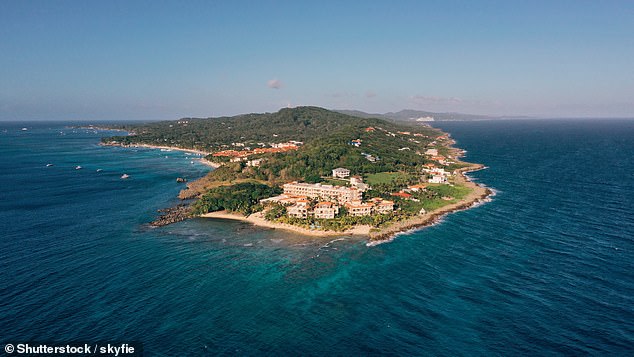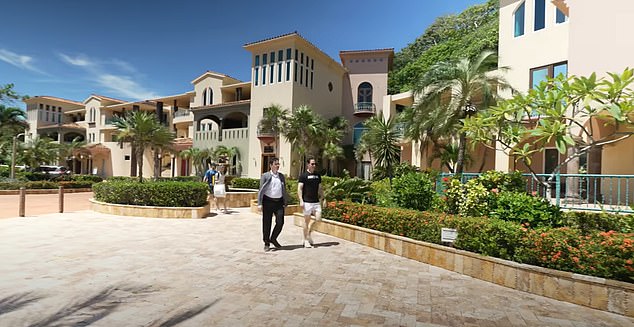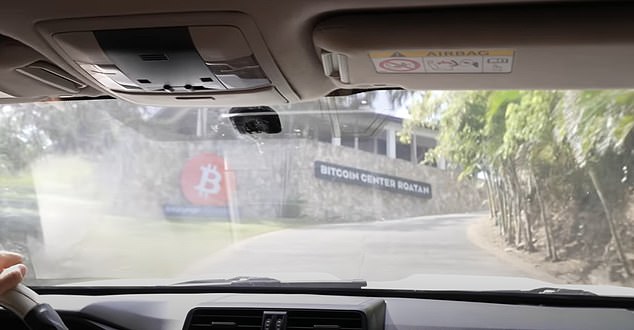The Caribbean is often seen as the ideal holiday destination, with turquoise seas, white sand, rum punch, and no stress.
But on one Honduran island, a different kind of paradise is taking shape.
This isn’t a place for a break but one to escape bureaucracy, regulation, and the two forces that usually catch up with everyone: death and taxes.
This is Próspera, a privately run, semi-autonomous city on the Honduran island of Roatán.
Funded by international investors and backed by Silicon Valley money, it markets itself as a low-tax haven for libertarians, tech entrepreneurs and biohackers looking to escape regulation, and, increasingly, mortality.
‘You get all kinds of wild stuff here,’ Jason Hart, a 46-year-old investor from Denver who became a full-time resident in 2023, told the Times.
‘One guy was building a jet pack, another doing “the Lord’s work” with Bitcoin. I just thought, this is my people.’
For residents like Hart, Próspera offers something close to a real-world Libertopia. Income tax is 5 per cent. Corporate tax is 1 per cent.
A company can be registered via smartphone in a matter of hours.

Among those to visit the zone is Bryan Johnson, the 47-year-old American tech entrepreneur who is investing millions in his own effort to reverse ageing

This isn’t a place for a break but one to escape bureaucracy, regulation, and the two forces that usually catch up with everyone: death and taxes

Last year, he made two trips to Roatán to receive therapy from Minicircle, a Próspera-based firm.
Regulation, where it exists, is optional with firms operating in the zone adopting the legal code of any country, or create their own.
This has attracted a growing number of start-ups focused on experimental medical treatments, including longevity gene therapy, a technology not currently approved by the US Food and Drug Administration or other major regulators.
Among those to visit the zone is American tech boss Bryan Johnson, 47, who is investing millions in his own effort to reverse ageing.
Last year, he made two trips to Roatán to receive therapy from Minicircle, a Próspera-based firm.
He later claimed that his biological ageing had slowed to the point that he only needed to celebrate his birthday every 21 months.
Próspera was made possible by a 2013 Honduran law allowing for the creation of ZEDEs, special economic zones with independent governance and taxation.
The model gained international attention after a 2009 TED talk by the economist Paul Romer, who argued that charter cities in the developing world could drive economic growth by offering clean governance and competitive markets.
But the concept has long attracted criticism. Detractors argue that the sale of land in poor countries to foreign investors, who then impose their own legal systems, resembles 19th-century colonialism.
Honduras, in particular, has been sensitive to the charge, with the the term ‘banana republic’ being coined after US fruit companies were granted extraordinary power in the region, including in Roatán.

He later claimed that his biological ageing had slowed to the point that he only needed to celebrate his birthday every 21 months

Próspera was made possible by a 2013 Honduran law allowing for the creation of ZEDEs, special economic zones with independent governance and taxation
‘Who are the real beneficiaries?’ asked Fernando Garcia, the Honduran government’s commissioner against special economic zones.
‘The great millionaires and billionaires who can go to live in a paradisiacal zone of our national territory, and who can then absorb ever more land.’
President Xiomara Castro, elected in 2021, has vowed to dismantle the ZEDE system entirely. In 2023, she signed legislation to repeal the law that enabled Próspera and two other zones.
Próspera’s backers, including the billionaire PayPal co-founder Peter Thiel, responded by filing a claim for $10.7 billion in damages, arguing that Honduras violated a 50-year legal stability agreement. The case is currently being heard by a World Bank tribunal.
Another blow came when Castro’s predecessor, Juan Orlando Hernández, a key supporter of the ZEDE legislation, was sentenced last year to 45 years in a US prison for trafficking hundreds of tonnes of cocaine.
The original vision for Próspera was a self-contained smart city modelled on Dubai but that future has yet to arrive.
The zone’s flagship construction is a 14-storey luxury apartment block, the tallest building on Roatán, built, according to a local, ‘without the use of a crane, labour is so cheap here’.

Mr Hart said: ‘One guy was building a jet pack, another doing “the Lord’s work” with Bitcoin. I just thought, this is my people’
Other planned towers remain unbuilt. Most of Próspera’s current assets stem from its acquisition of a nearby hotel and golf resort.
While there is no formal border separating Próspera from the rest of Roatán, visitors must register in advance and present a QR code to private security at the entrance.
Registration comes with the right to purchase property and open a business.
Just beyond the zone’s perimeter lies the fishing village of Crawfish Rock, where English is widely spoken and the houses sit shaded beneath mango trees.
The residents are descendants of enslaved Africans brought to the Bay Islands during British rule.
Some locals see opportunity in the development, with Sara Stewart, a housewife saying: ‘I’m OK with it. Maybe one day I could walk inside and I could get a job.’
However, others aren’t much fans of it: ‘A president cannot sign away pieces of our country!
‘And now they are suing for $11 billion. Who is going to end up paying for that? Us.’
Supporters of the project argue that cities like Próspera are meant to rise above the dysfunction of traditional governments.
But legal disputes and political blowback have already brought the future-facing experiment back down to earth.











